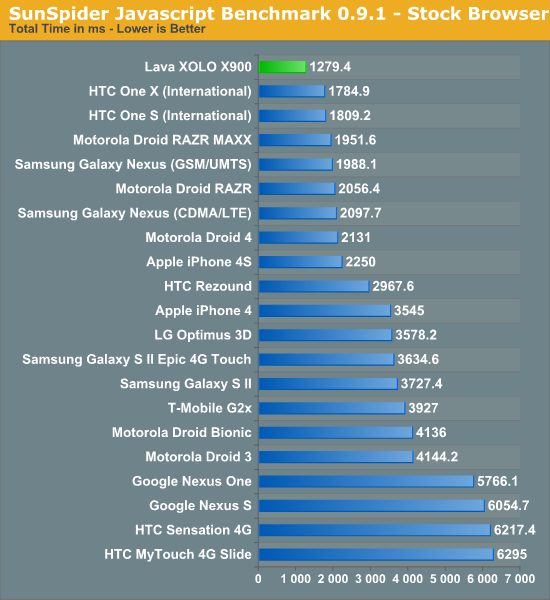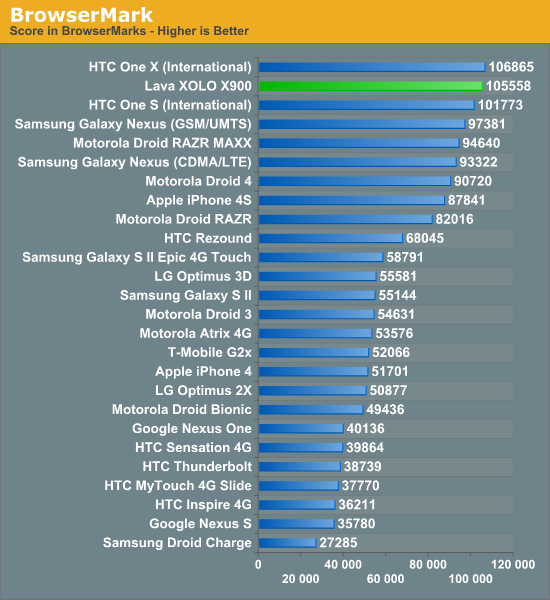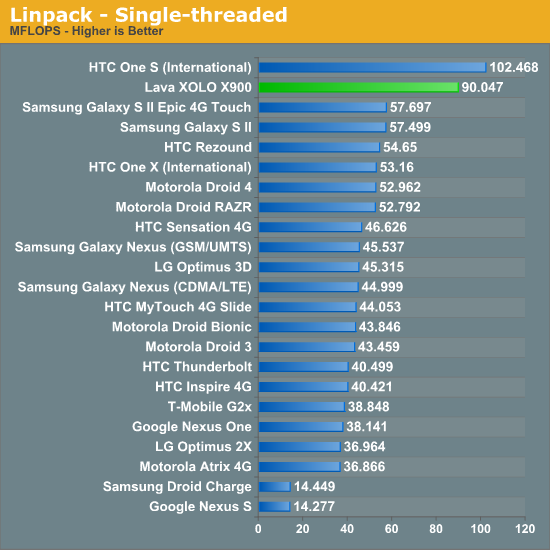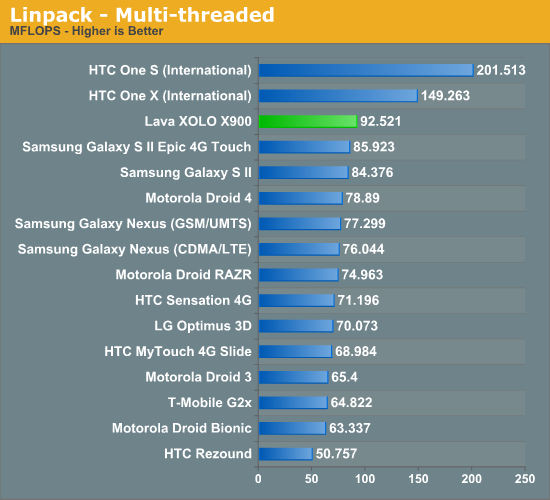You are using an out of date browser. It may not display this or other websites correctly.
You should upgrade or use an alternative browser.
You should upgrade or use an alternative browser.
Intel: Android just isn't ready for multi-core processors
- Thread starter Leeky
- Start date
Archean
Posts: 5,652 +103
@SCJake
You are forgetting that MS has lot more experience with regard to delivering OS which can dynamically scale according to hardware, so when it comes to mobile SoCs I expect them to deliver a better product than Google (as Linaro also proved just about same point with regard to Android's poor optimization). Not to mention its security/performance/stability issues, areas in which iOS and WP are miles ahead of android.
You are forgetting that MS has lot more experience with regard to delivering OS which can dynamically scale according to hardware, so when it comes to mobile SoCs I expect them to deliver a better product than Google (as Linaro also proved just about same point with regard to Android's poor optimization). Not to mention its security/performance/stability issues, areas in which iOS and WP are miles ahead of android.
J
Jibberish18
I take these comments as a slap in ARM's face. Maybe Mike Bell should clarify his statement a bit and say that Android isn't well suited for running on "Intel" multicore processors. ICS runs extremely well on my quad core TF201, CPU courtesy of ARM. Intel is still playing catchup in the GPU and low-power SOC market. Just more marketing BS from a company that's good at spin and not in results.
While I am sure there is a bit of hyperbole included since Mr. Bell works for Intel, benchmarking by Anandtech on Intel's mobile SoC (Medfield) running Android mostly validates what Mr. Bell is saying. Except for a few cases, it's the GPU that makes Android seem "smooth," not the CPU.
The Samsung Galaxy Nexus (dual core Snapdragon S4 @ 1.2GHz) and the Lava Xolo (first Medfield Android phone, single core Atom at 1.6GHz) use the same PowerVR 504 GPU although the Lava has the GPU clocked about 100MHz higher.
Anand's conclusion is that it's the GPU holding the phone from being the leader, not the CPU.
Quote: "The performance side is obviously even more competitive. Atom isn't always industry leading in our tests, but the X900 is rarely more than a couple places away from the top (with the exception of GPU performance of course, but that's a matter of licensing a different IP block in future versions)."
http://www.anandtech.com/show/5770/lava-xolo-x900-review-the-first-intel-medfield-phone/10
I have a dual-core Droid Bionic and I'm largely satisfied with the performance, but I want better battery life.
Couple of things I'd like to correct you on. The Galaxy Nexus does not have a Snapdragon S4. It has a Texas Instruments 4460. The GPU is not a 504 but a Power VR SGX540. The Galaxy SIII DOES however have a Snapdragon S4 for the carrier versions.
As for the article. Yeah Intel could be talking to make themselves seem better OR you know, they could not be talking out of their *** and actually saying the truth. So far we know that for years putting the fastest and newest hardware in a phone with Android does not mean absolute performance as shown by the literal stuttering nature doing simple things like flipping from page to page. But really, this is the nature of Android too. Apple and Microsoft can keep things tidy because they only allow certain hardware in their phones which means developers can optimize things quite a bit. Android can be used on any damn hardware at any damn time. Also remember that software in general isn't always optimized for multi core use, even on Windows/OSX/Linux. In the tech world, software is constantly trying to catchup with hardware.
mevans336
Posts: 161 +12
Couple of things I'd like to correct you on. The Galaxy Nexus does not have a Snapdragon S4. It has a Texas Instruments 4460. The GPU is not a 504 but a Power VR SGX540. The Galaxy SIII DOES however have a Snapdragon S4 for the carrier versions.
You are absolutely correct, thanks for the correction. Since my Bionic has the same CPU/GPU (just clocked lower) you would think confusing the two would be neigh impossible. Leave it to me to disprove that theory!
ViperSniper2
Posts: 49 +2
@Anonymous#1poster
Let me set you and Techspot straight on this. Because they insinuated that a supposed interview w/ a dirt bag GM (meaning only enough brains to tell Intel Engineers where to go potty on break) by the outright KING of Befuddled FUD Muckers...... INQUIRER!
Now that alone is good enough reason to discount not only who took down the Interview (Sensationalist Rag/Tabloid Reporters), but Techspot's Lee Kaelin for even considering that site as ever posting 100% Truth or more likely leaving out 95% of the Truth in any of their STORIES!
But back to Intel; GM's in general are not even close to knowing much of anything having to do w/ the actual technology, those that work under them must. They only have degrees are in Management..... (NOT electronics) and that's it!
That said, Intel is having problems competing with ARM and since ARM has already won the Mobile ARMS RACE, these Intel GM's resort to anything, that could save their jobs (arses). Mix in enough fact w/ FUD and for the average reader like YOU, it flies right over your heads. So here's what you do; Check out Benchmarks running on Quadcore ARM SoC processors (which Intel has none) and compare them to Single Core and Dual Core SoC processors. Then you might realize Mike Bell is full of Shizt! .....or perhaps you just don't GET THE REAL MOTIVE!
Intel wants to SELL YOU Intel Powered Phones and WINDOZ 8 TABLETS over ARM Based Products!!! ....duh
Let me set you and Techspot straight on this. Because they insinuated that a supposed interview w/ a dirt bag GM (meaning only enough brains to tell Intel Engineers where to go potty on break) by the outright KING of Befuddled FUD Muckers...... INQUIRER!
Now that alone is good enough reason to discount not only who took down the Interview (Sensationalist Rag/Tabloid Reporters), but Techspot's Lee Kaelin for even considering that site as ever posting 100% Truth or more likely leaving out 95% of the Truth in any of their STORIES!
But back to Intel; GM's in general are not even close to knowing much of anything having to do w/ the actual technology, those that work under them must. They only have degrees are in Management..... (NOT electronics) and that's it!
That said, Intel is having problems competing with ARM and since ARM has already won the Mobile ARMS RACE, these Intel GM's resort to anything, that could save their jobs (arses). Mix in enough fact w/ FUD and for the average reader like YOU, it flies right over your heads. So here's what you do; Check out Benchmarks running on Quadcore ARM SoC processors (which Intel has none) and compare them to Single Core and Dual Core SoC processors. Then you might realize Mike Bell is full of Shizt! .....or perhaps you just don't GET THE REAL MOTIVE!
Intel wants to SELL YOU Intel Powered Phones and WINDOZ 8 TABLETS over ARM Based Products!!! ....duh
Archean
Posts: 5,652 +103
Just to clear out your thought process:
"In short, ARM & Co. are in a very unenviable position. Intel now has a beachhead and its terrifying, industry-clobbering, 60%-gross-margin wehrmacht will surely follow. You might only see a few Medfield-powered scouts in 2012, but by the time the 22nm Silvermont tanks roll around in 2013 and x86 is better than ARM across the board, expect to see dozens of Santa Clara design wins. Unless TSMC, IBM, GloFo, or Samsung uncover some kind of ancient scroll that details the magic of 14nm, come 2014 and the Airmont core, I wouldn’t be surprised if Intel completely dominates the Android smartphone market."
Source: ExtremeTech
Being ahead by a whole full nod puts lots of pressure on ARM (& its partners), as none of them have enough muscle and know how to beat Intel on this, beside once Intel get this right, ARM in no way can maintain performance parity with x86; forget about power consumption comparison anyway. To reinforce:
Now that Intel’s in the ring, future devices from the top ARM vendors will have to compete on their merits against the most advanced foundry in the world. ARM will try to focus the debate on the question of architectural efficiency, but that ship has sailed. Whatever small differences favor ARM, the company will need them to offset Intel’s manufacturing lead.
Source: ExtremeTech
In addition, the fact that Medfield have 16 stage out-of-order pipeline compared to 8-stage in-order pipeline of ARM C9, and you get the picture why Medfield beats it even with a single core in tests. But Intel is not there, where they will be in couple of years.
With its combination of power, performance, and packaging, Medfield is a genuinely viable smartphone platform. Atom has always had the performance it needed to compete in this space, and now it also has the low power and high integration to tackle Cortex A9 head on. It might not always be the best in class, but it doesn't have to be the best. It has to be competent and credible, and it is both of those things.
Source: ArsTechnica




Clear evidence that Medfield is very competitive with dual cores and even quad core ARM chips.
Source: AnandTech
To sum it up, if ARM is unable to keep up with Intel, it could be next AMD.
So, next time you decide to utter something, do it with some research, instead of wasting time and space.
"In short, ARM & Co. are in a very unenviable position. Intel now has a beachhead and its terrifying, industry-clobbering, 60%-gross-margin wehrmacht will surely follow. You might only see a few Medfield-powered scouts in 2012, but by the time the 22nm Silvermont tanks roll around in 2013 and x86 is better than ARM across the board, expect to see dozens of Santa Clara design wins. Unless TSMC, IBM, GloFo, or Samsung uncover some kind of ancient scroll that details the magic of 14nm, come 2014 and the Airmont core, I wouldn’t be surprised if Intel completely dominates the Android smartphone market."
Source: ExtremeTech
Being ahead by a whole full nod puts lots of pressure on ARM (& its partners), as none of them have enough muscle and know how to beat Intel on this, beside once Intel get this right, ARM in no way can maintain performance parity with x86; forget about power consumption comparison anyway. To reinforce:
Now that Intel’s in the ring, future devices from the top ARM vendors will have to compete on their merits against the most advanced foundry in the world. ARM will try to focus the debate on the question of architectural efficiency, but that ship has sailed. Whatever small differences favor ARM, the company will need them to offset Intel’s manufacturing lead.
Source: ExtremeTech
In addition, the fact that Medfield have 16 stage out-of-order pipeline compared to 8-stage in-order pipeline of ARM C9, and you get the picture why Medfield beats it even with a single core in tests. But Intel is not there, where they will be in couple of years.
With its combination of power, performance, and packaging, Medfield is a genuinely viable smartphone platform. Atom has always had the performance it needed to compete in this space, and now it also has the low power and high integration to tackle Cortex A9 head on. It might not always be the best in class, but it doesn't have to be the best. It has to be competent and credible, and it is both of those things.
Source: ArsTechnica




Clear evidence that Medfield is very competitive with dual cores and even quad core ARM chips.
Source: AnandTech
To sum it up, if ARM is unable to keep up with Intel, it could be next AMD.
So, next time you decide to utter something, do it with some research, instead of wasting time and space.
ViperSniper2
Posts: 49 +2
They're using the same Thread Scheduler that's in the 2.6 Linux kernel since early 2011, when Google's Android was again brought back in the linux fold. It was written by none other than Intel's arch-nemisis IBM and that's interesting, because literally all of Intel's competition now have or will have multi-core processors. Yet all Intel has is their lame legacy Pentium based Medfield single cores going into cell phones. So it sounds like their frustration for not being invited to the Mobile Processor Party by manufacturers is beginning to get the best of them!!! haha....
btw.... you can look up "The Completely Fair Scheduler" on IBM's site or web. It's what every Linux distro or forked version using any kernel after 2.6 has built into it!!!
http://www.ibm.com/developerworks/linux/library/l-completely-fair-scheduler/
Somebody should ask that ***** if he even knows what Thread Scheduler Android is using! lol...
btw.... you can look up "The Completely Fair Scheduler" on IBM's site or web. It's what every Linux distro or forked version using any kernel after 2.6 has built into it!!!
http://www.ibm.com/developerworks/linux/library/l-completely-fair-scheduler/
Somebody should ask that ***** if he even knows what Thread Scheduler Android is using! lol...
Archean
Posts: 5,652 +103
One word ---> Linaro. You can also do a search for it. If an performance boost of 20/30% can be achieved by just 'optimization' it tells something.
As far CFS is concerned, I am inclined to believe that it is not targeted at any one architecture I.e. ARM or x86.
And to usefulness of CFS Patch, I'll quote Red Hat's Lennart Poettering:
"So, this patch only has an effect of people who build kernels from an xterm with make -j all day, and at the same time want to watch a movie, from a player they also start from a terminal, but from another one."
As far CFS is concerned, I am inclined to believe that it is not targeted at any one architecture I.e. ARM or x86.
And to usefulness of CFS Patch, I'll quote Red Hat's Lennart Poettering:
"So, this patch only has an effect of people who build kernels from an xterm with make -j all day, and at the same time want to watch a movie, from a player they also start from a terminal, but from another one."
Similar threads
- Replies
- 5
- Views
- 93
- Replies
- 2
- Views
- 284
Latest posts
-
The Best 4K Gaming Monitors: No Longer a Luxury
- Theinsanegamer replied
-
CERN researchers create gold from lead in breakthrough nuclear experiment
- ThomasTECH replied
-
Doom: The Dark Ages, 36 GPU Benchmark
- loki1944 replied
-
Fake MSRP: AMD's Radeon 9070 XT $600 Launch Price Was a Fantasy
- godrilla replied
-
TechSpot is dedicated to computer enthusiasts and power users.
Ask a question and give support.
Join the community here, it only takes a minute.